Emily Oster offers return-to-school tips from new book, 'The Family Firm'
The author and economist shares her perspective to help families.
Economist and bestselling author Emily Oster has tackled parenting issues that give families a bottom line to help them make better decisions.
Oster has helped crack an array of kid conundrums and her latest book, "The Family Firm," looks at issues for school-aged children; from picking the right school to screen time and tools for parents that approach these issues like a business executive.
"When you're parenting older kids, there are two big challenges. One is the day to day, the logistics," Oster told "Good Morning America." "The second is the big decisions that come up that you didn't expect. And this is a book with a strategy for dealing with both of those problems -- if you want to know how much should my kids sleep or what should they eat? There's a lot of data on those big questions."

The author touched on the importance of sleep and said: "When they bring kids into a study, they've shown that if you manipulate even kind of an hour -- it actually affects how kids perform in memory tasks and school tasks after a week."
When it comes to cellphones, social media and kids, Oster said that data is limited.
"We have some evidence that having access to online communities can help kids if they're struggling to connect with peers at school," she said, adding, "there is definitely a correlation between excessive social media use and things like depression. So some of this is going to have to be about evaluating ... how do you think your kid will react to this."
Oster is no stranger to controversy, previously facing criticism for her writing on breastfeeding and drinking during pregnancy. Last year, she was at the center of the debate over reopening schools, advocating that children should return to in-person learning.
"I think that it is very important in almost all of the discourses we have -- about parenting data, about COVID, that we allow different points of view because I think there's a way for many different disciplines to bring a perspective," she said.
She continued: "I looked out at what was going on and realized that we were not serving children well. I think we have learned over the pandemic that that when kids are not in in-person school, there are losses and learning, there are declines in mental health and how important having kids in in-person school is for their development."
Oster suggests creating "the big picture" and outlining the values and priorities in a home.




